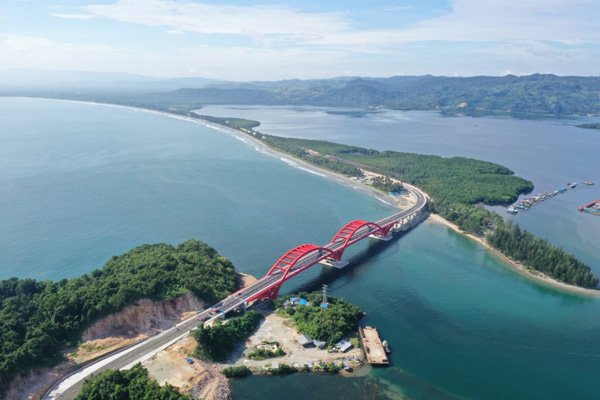President Prabowo Committed to Transforming Papua, Intensifying Sustainable Development
By: Viktor Awoitauw )*
The commitment to building a just and equitable Papua is a priority for President Prabowo Subianto and Vice President Gibran Rakabuming Raka. Through concrete steps, the eighth President of the Republic of Indonesia has shown his dedication to accelerating sustainable development in the Land of Cenderawasih.
The focus on sustainable development is expected to bring positive changes that touch all aspects of Papuan people’s lives, from economic, social, to environmental.
Papua, with its natural beauty and diverse cultural richness, holds great potential that is currently receiving government attention. Behind its beauty, this region faces many economic, social, and environmental challenges.
President Prabowo is committed to ensuring that development in Papua is carried out sustainably, utilizing local natural and cultural resources and prioritizing the welfare of local communities. Sustainable development based on local wisdom is an important point in realizing an advanced and prosperous Papua.
The Head of the National Unity and Politics Agency (Kesbangpol) of Papua Province, Musa Isir, assessed that the role of the Traditional Community Institution (LMA) must be strengthened in supporting the balance between economic, social and environmental needs.
By involving indigenous communities, Papua’s social and cultural stability can be maintained while continuing to implement development programs that support improving the welfare of rural communities.
The strong ties of indigenous peoples to the land and environment are an important foundation in designing policies that respect cultural heritage and the environment, so that the survival of indigenous peoples can be maintained along with the progress achieved.
The National Medium-Term Development Plan (RPJMN) prepared by the government for the 2024-2029 period includes a continuation of various development achievements from the last decade.
This indicates consistency in development efforts in Eastern Indonesia. In the plan, the focus is directed at investment in strategic sectors such as smelters, fertilizers, and food which will be the foundation for sustainable development in Papua.
These efforts not only focus on physical development, but also target community empowerment so that they can be economically independent and play an active role in development.
In addition, transmigration carried out in Papua is also directed to support sustainable development. The Minister of Transmigration, Muhammad Iftitah Sulaiman Suryanegara, emphasized that transmigration does not only mean the movement of people between islands.
In Papua, this concept is further developed in the form of local transmigration, where residents from one region in Papua can be moved to another region with certain considerations.
With a more adaptive transmigration model, people can access new land without having to bring in residents from outside Papua. Minister Iftitah also stated that the Ministry of Transmigration will focus more on revitalizing existing transmigration areas, including in Papua, to maximize the use of land that has been prepared.
The national leader who is also a retired high-ranking Indonesian military officer gave direction for the Ministry of Transmigration to prioritize development in the Eastern Indonesia region, especially Papua. The goal of this program is in line with efforts to accelerate economic growth and equitable development in the region that has abundant natural resources.
Through the transmigration revitalization program, it is hoped that Papua’s development can involve local communities, maximize local wisdom, and create a stable social environment.
Coordinating Minister for Food, Zulkifli Hasan, revealed that Papua, especially Merauke, has great potential as a future food barn for Indonesia. The Head of State directed the focus of development on sustainable food security in Papua.
The area has been made a food development center (food estate) that focuses on the production of main commodities such as rice, sugar cane, and corn. With the food development strategy in Merauke, President Prabowo hopes to realize food self-sufficiency within five years.
The development of a food estate in Merauke is an important step in ensuring food availability for Indonesia. Coordinating Minister Zulkifli, who also received a mandate from President Prabowo to implement this strategy, expressed his belief that with a focused approach, the target of food self-sufficiency that has been set can be achieved.
The strategy will not only strengthen national food security but also create economic opportunities for local communities. Thus, economic growth in Papua can be more independent and no longer fully dependent on external supplies.
All of these policies show that the national leader born in 1951 views Papua’s development as a mission that must be carried out comprehensively, sustainably, and involving local communities.
The local wisdom-based approach is expected to not only meet the needs of the Papuan people today but also ensure the welfare of future generations. By prioritizing local cultural values and focusing on community empowerment, Papua is expected to be able to realize its great potential as a region nicknamed the Little Heaven in Eastern Indonesia.
President Prabowo’s commitment to accelerate sustainable development in Bumi Cenderawasih reflects his determination to bring Papua towards a more advanced and prosperous direction.
Through various programs and policies that have been designed, the government seeks to ensure that every step of development provides real benefits to the Papuan people, making them more independent, prosperous, and proud of their identity and culture.
)* Students from Papua live in Bandung
